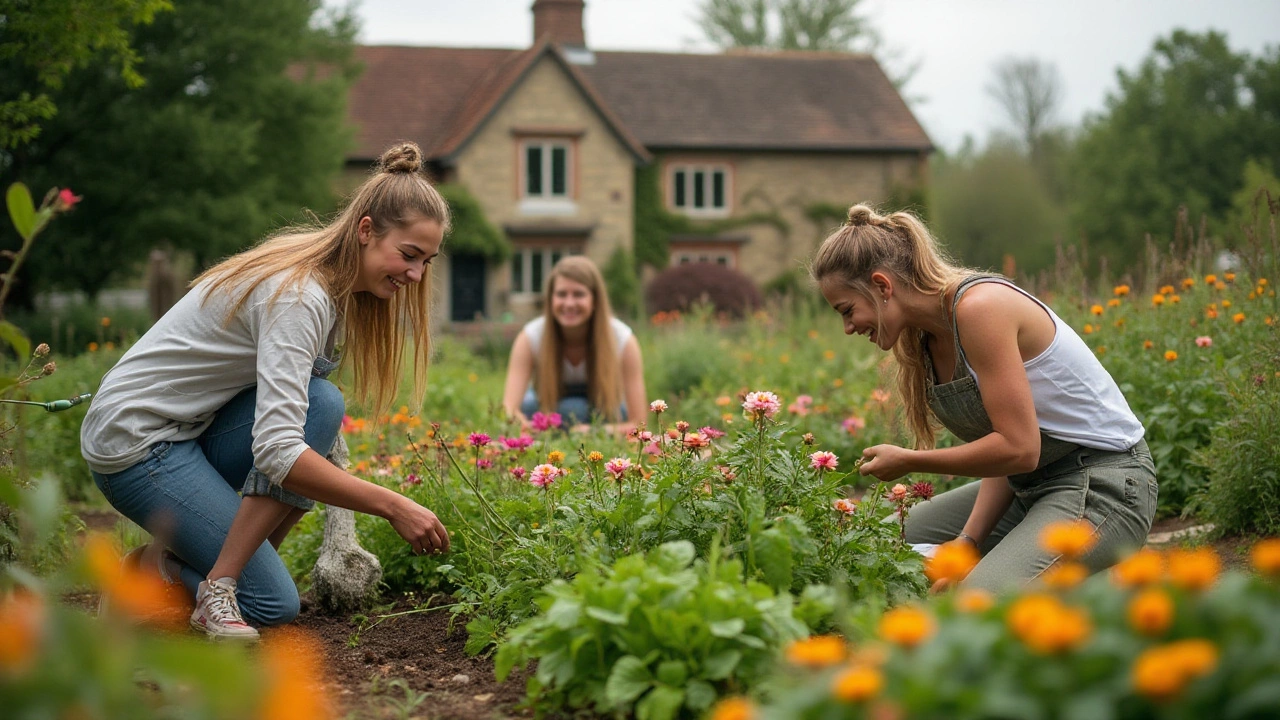The Unsung Heroes: Frequent Volunteers and Their Impact
 Jan, 3 2025
Jan, 3 2025
Volunteers are often the lifeblood of community projects, working tirelessly to promote a culture of giving and support. Those who dedicate substantial amounts of their time and effort, commonly known as frequent volunteers, are extraordinary individuals whose efforts often go unrecognized. They might be called various names—devoted helpers, altruistic warriors, or simply unsung heroes—but their shared passion is undeniable.
These individuals are driven by a myriad of reasons, from a deep sense of duty to a simple desire to give back. Their influence extends beyond face-to-face interactions, instilling a profound sense of community cohesion and fostering a culture of sharing and mentorship. By digging into the motivations and impacts of these dedicated contributors, we find lessons on how to nurture similar aspirations within our own lives.
- Understanding the Term 'Frequent Volunteer'
- Motivations Behind Volunteering
- Impact of Volunteering on Communities
- Tips for Becoming a Regular Volunteer
Understanding the Term 'Frequent Volunteer'
Diving into the world of volunteering, we begin to unravel a tapestry rich with the threads of humanity and goodwill. A 'frequent volunteer' is not merely an individual who occasionally offers their assistance. Instead, this term signifies someone who consistently engages in community service activities, carving out time from their day-to-day lives to extend help where it's most needed. The dictionary might define volunteering as undertaking a task or service by one's own volition, but a frequent volunteer takes this to another level through regular commitment.
The dedication of a frequent volunteer can sometimes surpass that of a full-time job. This commitment demands a deep, unwavering passion for altruism and an instinctual drive to foster positive change. Such volunteers often integrate charitable activities into their routines, sometimes to the point where it becomes an integral part of their identity. According to United Nations Volunteers (UNV), about 970 million people are engaged in volunteer work worldwide each year, with frequent volunteers being a significant contributor to this staggering figure.
Volunteering frequently does not just create opportunities for service, it also develops a strong sense of belonging within the individual. They view themselves as part of a larger movement or community, often forming lifelong connections with others who share similar values. An article from the American Psychological Association highlighted that regular volunteering can increase volunteer satisfaction levels by up to 29%, encouraging prolonged participation and dedication.
Dr. Susan Ellis, a renowned expert in volunteerism, once stated, "Volunteers are paid in six figures... S-M-I-L-E-S," capturing the essence of the rewards that frequent volunteers cherish the most.
It's this motivation and passion that enables these individuals to become cornerstones within their communities. When they frequently volunteer, they not only help organizations achieve their missions but also inspire others to contribute whatever they can. In the midst of their busy schedules, they lend a continuous helping hand, converting small moments of humanity into long-lasting impacts. This commitment can create ripples, inspiring friends, families, and even strangers to join in and contribute to similar efforts.

Motivations Behind Volunteering
Why do people choose to dedicate precious time and energy to volunteer work without any expectation of monetary reward? The motivations behind volunteering can be as diverse as the volunteers themselves. Many individuals are driven by a profound desire to make a difference in their communities, feeling a sense of responsibility toward those around them. This intrinsic motivation often stems from personal experiences or a deep commitment to social justice. These altruistic champions find rewards not in finance but in the satisfaction of knowing their efforts create ripples of positive change. Furthermore, the connections made during community service are often irreplaceable, offering a sense of belonging and mutual understanding in an increasingly fragmented world.
For some, volunteering offers an opportunity for personal growth and skill development. In a global economy that values diverse experiences, volunteering can provide a platform for honing leadership skills, building networks, and enhancing resumes. Many young people approach volunteer opportunities as a chance to explore potential career paths, offering them real-world experience in various fields. This practical engagement empowers them beyond academic learning, filling a vital gap that conventional education often doesn't address. In a survey conducted by Volunteering UK, 65% of young adults reported gaining career-related benefits from their voluntary work, highlighting its role as a valuable stepping stone into professional life.
The social benefits of volunteering are equally compelling. Humans, by nature, are social creatures, and the act of contributing to a cause greater than oneself can provide a substantial boost to mental health and emotional wellbeing. There is a therapeutic aspect to offering one's skills and time without expectation, which can alleviate symptoms of anxiety and depression. By participating in volunteering efforts, individuals can find purpose and direction that might otherwise be absent in their daily routines. Social connections forged in such settings are grounded in shared goals and camaraderie, often leading to lasting friendships and support networks.
"Volunteers do not necessarily have the time; they just have the heart." - Elizabeth Andrew
Moreover, for retirees or those in transitional life stages, volunteering can serve as an avenue for staying active and engaged. It keeps the mind sharp and the body moving, combating feelings of isolation that may arise with age or significant life changes. This ongoing involvement with community activities ensures that individuals remain integral members of society, respected for their experience and wisdom. A study by the Corporation for National and Community Service found that senior individuals who volunteer report better health and a higher quality of life compared to those who do not engage in such activities.
Finally, there is the power of legacy, where individuals are motivated by the desire to leave behind a better world for future generations. This selfless pursuit can lead to the establishment of lasting programs and initiatives, bequeathing knowledge and support to empower others. Whether it’s organizing charity events, mentoring at-risk youth, or partaking in charity campaigns, these individuals plant seeds of change that can flourish long after they are gone. The impact of these activities on a personal and global scale cannot be understated, as they inspire successive generations to champion similar causes with enthusiasm and dedication.

Impact of Volunteering on Communities
Volunteering creates a ripple effect that spreads far beyond the immediate act of kindness, profoundly touching both the individual and societal levels. At the heart of these effects lies a powerful transformation within communities, nurturing growth, resilience, and unity. By engaging in community service, volunteers lay the groundwork for a more cohesive and understanding society. This enhanced social bond is more than just collaboration; it's the embodiment of shared goals and mutual support. When people come together through volunteer efforts, community ties are strengthened, offering a sense of belonging and shared purpose.
The positive impacts of volunteering are seen in various sectors, from education to health care, and even in environmental conservation. For instance, consistent community service initiatives can lead to improved educational outcomes as mentoring programs aim to bridge the achievement gap for disadvantaged youth. Such projects often rely upon the dedication of volunteers to flourish and succeed, affecting both the present and future prospects of all involved. There's also an economic advantage to extensive volunteer work. Studies have shown that volunteering can significantly contribute to the local economy by providing services that might otherwise require professional fees, enabling funds to be redirected to other necessary areas. This reallocation benefits those in need, thus reinforcing the fabric of society.
Emotional well-being is another noteworthy effect of community service, benefiting everyone from individual volunteers to the community as a whole. People who invest time and energy into altruistic endeavors often find a sense of fulfillment and satisfaction that comes from knowing they have contributed positively to society's health. This positive outlook can then translate into increased civic engagement, where people are more likely to participate in other community-building activities. Each act of volunteering, every hour spent, and each smile shared plants a seed of endless possibilities. Communities find not only new solutions to existing problems but also discover unheard-of paths for growth and resilience.
Moreover, certain noteworthy statistics underscore the incredible influence of volunteering on both local and national levels. It's estimated that millions of individuals volunteer their time worldwide, contributing an enormous sum of economic worth that surpasses billions annually. Consider a report indicating that in the United Kingdom alone, volunteer labor racks up an impressive sum equivalent to 1.2% of the GDP annually, highlighting just how crucial these contributions are in sustaining societal structures.
"Volunteers do not necessarily have the time; they just have the heart," observes Elizabeth Andrew, an excerpt that perfectly encapsulates the spirit of volunteerism and its boundless contributions.
With the power to inspire, unite, and transform, volunteers do more than provide support—they ignite change at fundamental levels. Every village, town, and city is a recipient of this benevolence, driving home the message that volunteering is integral to nurturing a socially and economically resilient community.

Tips for Becoming a Regular Volunteer
Embarking on the journey to become a regular volunteer can be immensely rewarding, but it requires a certain level of commitment and strategy. It's essential to begin by identifying the causes that resonate deeply with you. Whether your passion lies in environmental conservation, providing education to underprivileged children, or helping the homeless, aligning your volunteer work with your personal values guarantees a more fulfilling experience. Understanding your motivations not only helps in maintaining your enthusiasm but also ensures that you contribute meaningfully to your chosen cause.
Time management is crucial when integrating volunteering with other life responsibilities. Begin by assessing your current schedule and carving out dedicated slots for volunteer activities. Consider starting with small, manageable commitments and gradually increasing your involvement as you become more accustomed to volunteering. Creating a balanced schedule ensures that you remain committed to your volunteer work without feeling overwhelmed. Many find it helpful to set clear goals and review them monthly to stay focused and energized.
Another important aspect is to do thorough research on the organizations you wish to support. Look into their track record, mission statement, and community impact. Reliable organizations provide clear guidelines for volunteers and appreciate the effort contributed by their team. Volunteering with a reputable organization not only enhances your experience but also allows you to make connections with like-minded people. Make sure to ask questions and seek feedback during your volunteer tenure, as this encourages continuous learning and improvement.
Engaging in self-reflection is key to continuous growth as a volunteer. Regularly evaluate your experiences and adjust your approach as necessary. Reflection allows you to acknowledge your contributions and the impact of your work on the community. It's also worthwhile to document your experiences, keeping a journal or digital log of your journey. Such reflections can inspire others and serve as a reminder of the positive difference you're making in the world.
Building a supportive network can also enhance your volunteering efforts. Connect with fellow volunteers to share experiences, challenges, and successes. Many organizations offer volunteer meetups or online groups where sharing ideas can lead to collaborative projects or more efficient strategies to achieve common goals. Being part of a community of frequent volunteers can inspire you to keep pushing forward and find new, innovative ways to contribute.
"The best way to find yourself is to lose yourself in the service of others." — Mahatma Gandhi
Once you're ready to take the plunge, consider expanding your skillset with new roles and responsibilities. Don't hesitate to step out of your comfort zone; each new challenge is an opportunity to learn and grow. Whether it's leading a team project or training new volunteers, actively seeking out growth experiences can increase your impact significantly. Remember, volunteering is as much about personal development as it is about helping others.
